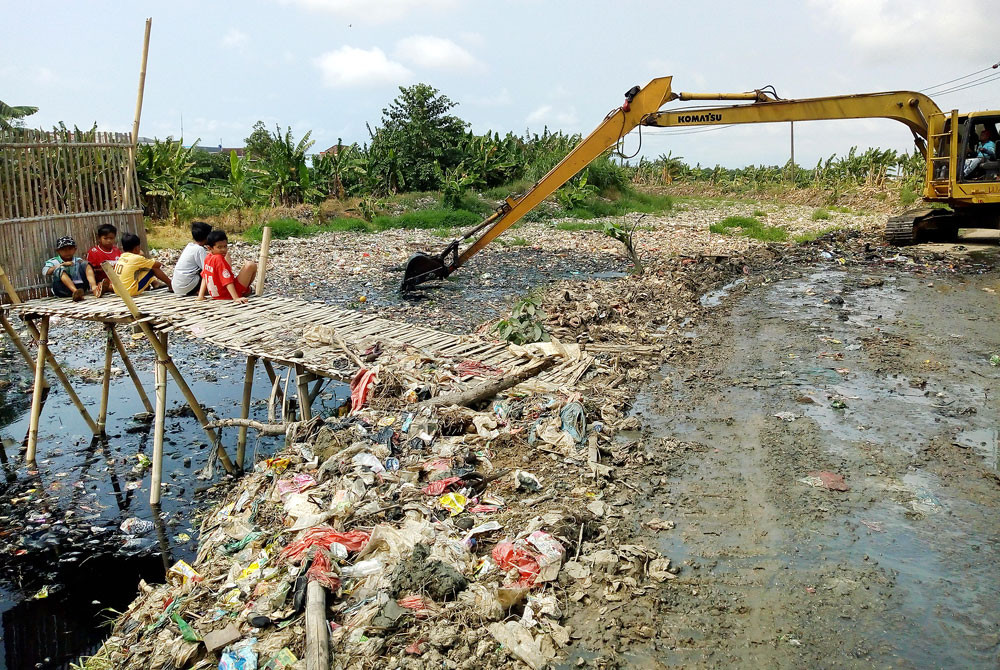Popular Reads
Top Results
Can't find what you're looking for?
View all search resultsPopular Reads
Top Results
Can't find what you're looking for?
View all search resultsRegions lag behind in waste management planning
Only 30 percent of all regional administrations have what the government considers a feasible waste management plan.
Change text size
Gift Premium Articles
to Anyone
T
he government set an ambitious target to reduce household waste in 2017 following pressure from inside and outside the country to take more serious steps in addressing the growing problem of waste.
The target, stipulated in Presidential Regulation No. 97/2017 on waste management, states that Indonesia must reduce its household waste volume by 30 percent and recycle 70 percent of its waste by 2025.
It also requires every region across the archipelago to work together in achieving the target. According to the regulation, one of the tasks that must be completed by each region is the drafting and submitting of a detailed strategy on managing household waste.
However, it appears that drafting a detailed road map on managing waste remains a challenging task, as most regional administrations have been slow to draw up and implement any strategies.
This has raised concerns on whether the country will be able to fulfill its waste reduction and management targets by 2025.
According to the Environment and Forestry Ministry, 300 out of 514 cities and regencies and 17 out of 34 provinces submitted a detailed waste management strategy before the deadline in October 2018.
“Of the total number of regencies and cities that already submitted their strategy, only about 30 percent, around 100 regions, have plans that are considered feasible and logical,” the ministry’s waste management director, Novrizal Tahar, told The Jakarta Post recently.
An important component in mapping out a strategy is the waste management scale, which shows how much waste can be managed and reduced through various measures by each region. The scale must be updated at least twice a year – in June and December – to reflect the most up-to-date figures.
Novrizal said the slow progress could be a result of a lack of commitment and small budgets at the regional level.
Concerns over budgets were echoed by Statistics Indonesia (BPS) in its 2018 environmental report. According to the report, not a single province allocated more than 3 percent of its 2017 regional budget for the environment, including waste management.
Meanwhile, several regions blamed the ministry for failing to provide them with assistance in drawing up a feasible plan. In West Java, a senior official at the Bandung Environment Agency, Deti Yulianti, complained about a lack of technical guidance.
The director of the Bioscience and Biotechnology Development Foundation, David Sutasurya, voiced similar concerns.
“Regional administrations tend to follow a template provided by the central government without any technical guidance in reaching targets, even though each region has its own characteristics and challenges,” he said.
Novrizal dismissed the criticism, saying the ministry had provided technical guidance in drafting and implementing strategic planning through a 2018 ministerial regulation.
“We also set up a coaching clinic for regional administrations in drafting and implementing their waste reduction strategy,” he said. However, Novrizal conceded that there could be issues surrounding the fact that waste management planning was a relatively new concept for most regional administrations.
One of the few regions that has successfully drafted and implemented a waste management system is Malang, East Java. The city has been running a waste program since 2011.
“However, we still need to increase public participation in reducing and managing waste [...] especially at the level of the community or neighborhood,” said Rahmat Hidayat, a senior official of the Malang Environment Agency.
In addition to sending warnings to regional administrations through circulars, the ministry has been imposing what it calls soft law enforcement measures on regional administrations that have yet to produce a detailed waste management strategy, giving them low environmental assessment scores.
Medan, the capital of North Sumatra, was among the cities that scored the lowest last year – due in part to its lack of a comprehensive strategy and status as one of the dirtiest cities in Indonesia – only months after the city committed to a zero-waste initiative in April last year.
“The vision is good, but we still need to make sure that such commitment produces actual results,” Indonesian Forum for the Environment (Walhi) North Sumatra office director Dana Prima Tarigan said.










